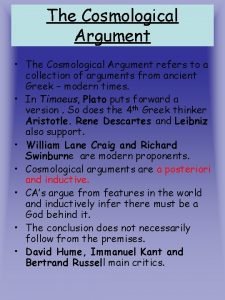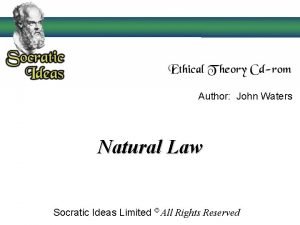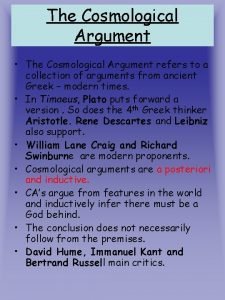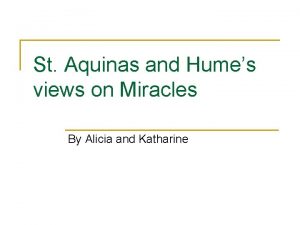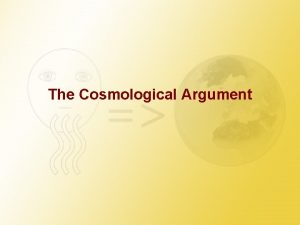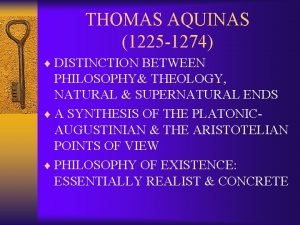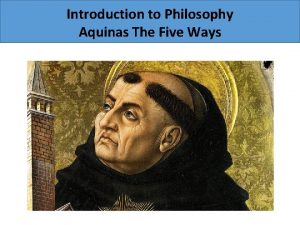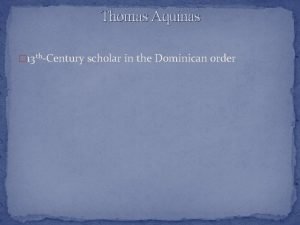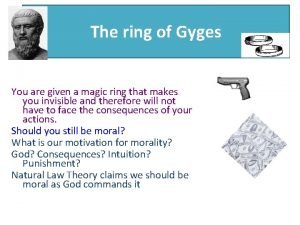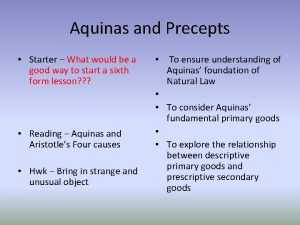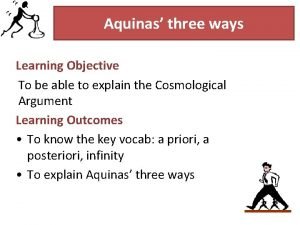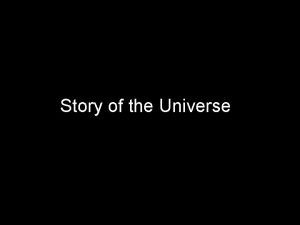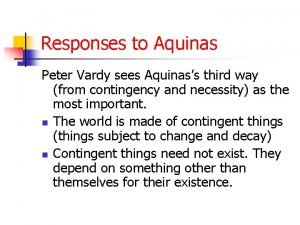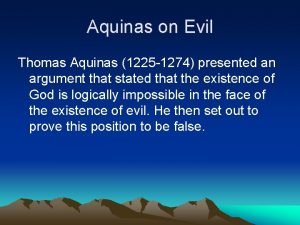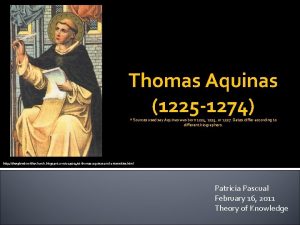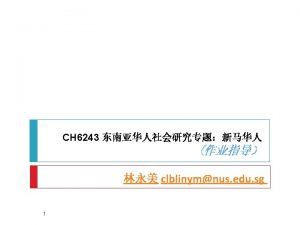Thomas Aquinas 13 thCentury scholar in the Dominican























- Slides: 23

Thomas Aquinas � 13 th-Century scholar in the Dominican order

Thomas Aquinas � 13 th-Century scholar in the Dominican order �Incorporates rediscovered Aristotelian concepts and principles into Catholic doctrine

Thomas Aquinas � 13 th-Century scholar in the Dominican order �Incorporates rediscovered Aristotelian concepts and principles into Catholic doctrine �Christian Aristotelianism ≠ Aristotle

Thomas Aquinas: Summa Contra Gentiles �One of two major works (also: Summa Theologica)

Thomas Aquinas: Summa Contra Gentiles Human action Every action aims at some end. Every agent acts only for ends befitting to the agent. What is befitting to a thing is good for it. Therefore, every action aims at some good.

Thomas Aquinas: Summa Contra Gentiles The end of human action � (“end” in the sense of “purpose, ” not “conclusion”)

Thomas Aquinas: Summa Contra Gentiles The end of human action “The last end of man and of any intelligent substance is called happiness or beatitude, for it is that every intellectual substance desires as its last end, and for its own sake alone. ”

Thomas Aquinas: Summa Contra Gentiles The end of human action “The last end of man and of any intelligent substance is called happiness or beatitude, for it is that every intellectual substance desires as its last end, and for its own sake alone. ” People disagree, however, about the nature of happiness.

Thomas Aquinas: Summa Contra Gentiles The end of human action “The last end of man and of any intelligent substance is called happiness or beatitude, for it is that every intellectual substance desires as its last end, and for its own sake alone. ” People disagree, however, about the nature of happiness. Aquinas's view: Man's ultimate happiness consists in the contemplation of God.

Thomas Aquinas: Summa Contra Gentiles �Not pleasure -- or even virtue

Thomas Aquinas: Summa Contra Gentiles �Why happiness does not consist in pleasure

Thomas Aquinas: Summa Contra Gentiles �Why happiness does not consist in pleasure �Pleasure exists for the sake of operation. �Man's ultimate happiness is something that exists for its own sake. �Therefore, happiness does not consist in pleasure.

Thomas Aquinas: Summa Contra Gentiles Why happiness does not consist in acts of virtue All moral activities are directed toward something else.

Thomas Aquinas: Summa Contra Gentiles Why happiness does not consist in acts of virtue All moral activities are directed toward something else. Example: Courage in war is directed toward the end of victory and peace.

Thomas Aquinas: Summa Contra Gentiles Why happiness does not consist in acts of virtue All moral activities are directed toward something else. Example: Courage in war is directed toward the end of victory and peace. Ultimate happiness cannot be directed toward a further end. Therefore, happiness does not consist in acts of virtue.

Thomas Aquinas: Summa Contra Gentiles �So: True happiness is…

Thomas Aquinas: Summa Contra Gentiles �True happiness: �“Man's ultimate happiness consists in the contemplation of truth. ” �As Aristotle claimed, happiness consists of contemplation of the highest object. �The highest object of contemplation is God. �Therefore, man's ultimate happiness consists in contemplation of God.

Thomas Aquinas: Summa Contra Gentiles �If true happiness consists in contemplation of God, then the good life does not consist in virtue – however virtue may be an instrument in the good life.

Thomas Aquinas: Summa Contra Gentiles �If true happiness consists in contemplation of God, then the good life does not consist in virtue – however virtue may be an instrument in the good life. � Prudence � Justice � Temperance � Fortitude

Thomas Aquinas: Summa Contra Gentiles �If true happiness consists in contemplation of God, then the good life does not consist in virtue – however virtue may be an instrument in the good life. � Prudence � Justice � Temperance � Fortitude �Also: � Faith � Hope � Charity

Thomas Aquinas: Summa Contra Gentiles �If true happiness consists in contemplation of God, then the good life does not consist in virtue – however virtue may be an instrument in the good life. �Through Christian virtues, we can understand the natural law

Thomas Aquinas: Summa Contra Gentiles �If true happiness consists in contemplation of God, then the good life does not consist in virtue – however virtue may be an instrument in the good life. �Through Christian virtues, we can understand the natural law (reason applied to nature – a discovery process)

Thomas Aquinas: Summa Contra Gentiles �If true happiness consists in contemplation of God, then the good life does not consist in virtue – however virtue may be an instrument in the good life. �Through Christian virtues, we can understand the natural law (reason applied to nature – a discovery process) �Human law is only valid if it conforms to natural law. If a law is unjust, then it is not actually a law, but is a "perversion of law"
 Stream of consciousness literature
Stream of consciousness literature Thomas aquinas facts
Thomas aquinas facts Descartes cosmological argument
Descartes cosmological argument Thomas aquinas natural law
Thomas aquinas natural law St thomas aquinas cosmological argument
St thomas aquinas cosmological argument St thomas aquinas miracles
St thomas aquinas miracles St thomas aquinas cosmological argument
St thomas aquinas cosmological argument Good people do not need laws plato
Good people do not need laws plato Thomas aquinas epistemology
Thomas aquinas epistemology Pemikiran politik thomas aquinas
Pemikiran politik thomas aquinas Aquinas fourth way
Aquinas fourth way My aquinas
My aquinas In aquinas view man's ultimate happiness consists in
In aquinas view man's ultimate happiness consists in Aquinas learning cycle 1
Aquinas learning cycle 1 Aquinas natural law essay
Aquinas natural law essay Secondary precepts examples
Secondary precepts examples Aquinas three ways
Aquinas three ways Aquinas.org
Aquinas.org Aquinas third way
Aquinas third way Pentecost images holy spirit
Pentecost images holy spirit Manila to dominican republic
Manila to dominican republic Dominican slang
Dominican slang Dominican missionaries
Dominican missionaries Beach dominican republic
Beach dominican republic


